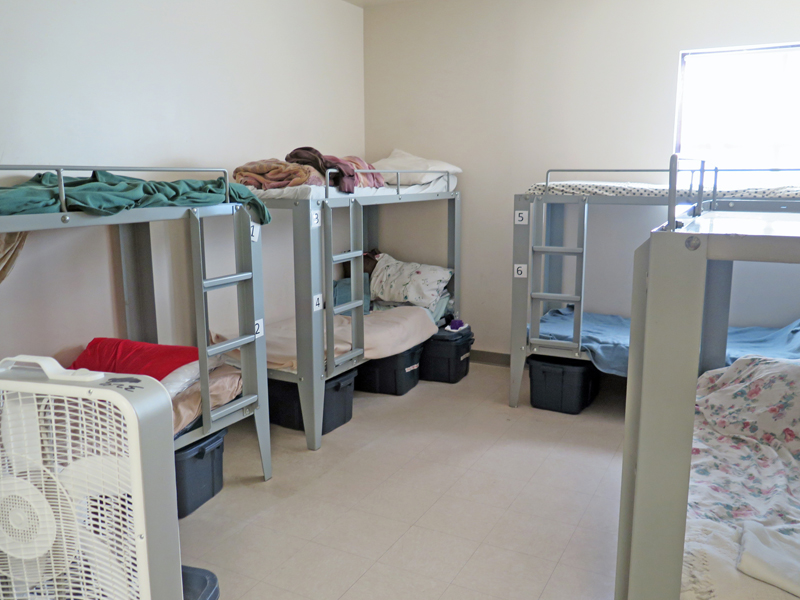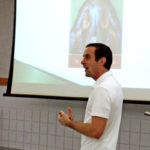By Anne Marie Amacher
The Catholic Messenger
When disasters ranging from fires to weather events occur, nonprofit organizations often are the first to step up and offer help. But what happens if a disaster strikes the nonprofit’s facility or occurs on a large scale in the community. Is the nonprofit prepared?
That is a question the Community Foundation of the Great River Bend (CFGRB) is working to answer with a nonprofit disaster preparedness program. The foundation is making sure that nonprofits not only meet the needs of the community but are prepared for disaster themselves.

Humility of Mary Shelter in Davenport is participating in a nonprofit disaster preparedness program through the Community Foundation of the Great River Bend.
“In many ways, we are always functioning in crisis mode, so we rarely have the time to get beyond that to do structured planning in case of a disaster,” said Christie Adamson, director of services at Humility of Mary Shelter in Davenport. “They are not alone,” said Carrie McKillip, unit educator at University of Illinois Extension. She is leading workshops for nonprofits in disaster preparedness planning.
Kelly Thompson, director of programs at the Community Foundation, said after the nonprofits complete the training, participate in a one-on-one meeting and have a plan in place, they can apply for grants to assist with disasters. “If there is a major disaster, then there will likely be more people who need services,” she said. “Nonprofits (as well as any home or business) need to have a plan in place for a disaster.” Recovery can take a long time, depending on the severity and extent of the disaster, she noted.
Thompson said the nonprofit disaster preparedness program was created as a result of the Community Foundation’s participation in the Philanthropic Preparedness, Resiliency and Emergency Partnership. It is a project of the Funders’ Network for Smart Growth and Livable Communities. The project supports a disaster preparedness, response and recovery learning cohort for community foundations in an eight-state Midwestern region. The Community Foundation was one of 18 such foundations selected to participate.
Thompson said that after learning the University of Illinois Extension has a disaster educator in Knoxville County, she worked with McKillip to sketch out an idea to help nonprofits plan for disasters. The partnership has resulted in the disaster preparedness program. McKillip is leading a series of trainings for Quad-City area nonprofits.
“At the Community Foundation, we know that our local nonprofits are caring for our most vulnerable citizens every day, and that these citizens are disproportionately impacted when disaster occurs,” said Thompson. “We need to make sure that these excellent organizations are still there to help them when a crisis does happen.”
On March 17, eight nonprofits participated in a three-hour workshop led by McKillip. Following the workshop, nonprofits started to think about issues they might need to address. McKillip has been doing one-on-one site visits with each organization. “No one size fits all,” she noted, when it comes to making a plan.
Since participating in the workshop, Adamson and a committee at Humility of Mary Shelter have worked on plans for crisis contacts, evacuation and how to communicate with other entities if electric power and phone services become limited, among other topics. “Carrie (McKillip) walked us through some weaknesses she saw and helped guide us to strengthen our plan and how to implement it,” Adamson said. That plan, still in progress, will be presented to the nonprofit’s executive director and board in the future. When the plan is approved, all staff and volunteers need to be trained on what to do if a disaster occurs. At that point, the organization will look at applying for a grant to help implement the plan.
McKillip said the nonprofit organizations will be able to apply for grants to fund tools or resources they may need to maintain operations during a disaster. One example might be the purchase of a generator. A total of $40,000 in grants will be available. She hopes to serve up to 30 organizations.
Thompson said two more workshops are open for nonprofits in the 17-county area that serves eastern Iowa and western Illinois. The first will be June 15 and the second Sept. 16. Nonprofits interested in attending, can visit www.cfgrb.org/npdisasterprep.











